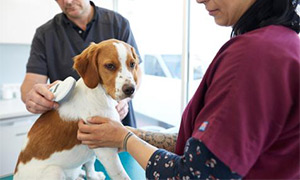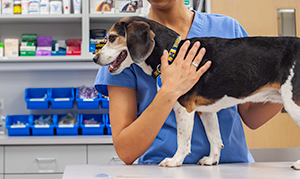When The Chips Are Down

Choosing the best microchip package for clients is the key to maintaining the strong bond between them and you, their vet. Whether the client is a breeder or your average pet owner, factors such as cost, service and communication around microchipping are key to being able to use this service as an opportunity to enhance relationships. Microchipping remains a big opportunity for veterinary practices but possibly, 2 years on since compulsory microchipping, is often overlooked. Broadening the market to microchip a variety of pets has a positive impact on overall business and the other services provided and is backed by a strong welfare argument.
It has now been over three years since the introduction of compulsory microchipping in the UK which came into force on 6th April 2016. This legislation, which was widely welcomed by the veterinary profession, means that all dogs must be microchipped, all puppies must be microchipped by 8 weeks of age with the breeder recorded as the first keeper and that recorded keepers must keep their contact details up to date on a government compliant database.
Leading up to the introduction of compulsory microchipping, veterinary practices reported a significant increase in microchip implantations as pet owners rushed to get their pets microchipped before the deadline date. Compared to the same period in the previous year microchip sales into veterinary practices increased by a staggering 220% (See figure). The PDSA estimate that 93% of UK dogs are now microchipped which is an increase from 70% in 2011, suggesting that the introduction of compulsory microchipping has had a positive impact (PDSA Paw Report 2017).
Of course all dog owners should have their dog microchipped by law, but there are still those 7% who remain unchipped (circa 651,000). Interestingly 11% of dog owners are still unaware that microchipping is compulsory by law (PDSA Paw Report 2017). With dog thefts on the rise and more than 60 dogs estimated to be stolen in the UK every week (inews, 2018), it couldn’t be more important today to help pet owners comply with this legislation.
Whilst microchipping compliance is still far from perfect in dogs, it is significantly better than cats, which many would argue are more likely to benefit from microchipping owing to their free roaming lifestyle; yet the PDSA estimates that 36% of cats in the UK are not currently microchipped.
Veterinary surgeons and veterinary nurses see the significant benefits that microchipping brings almost on a daily basis, when being able to unite (or not) a lost or stolen pet with their owner. They are also experienced in microchipping a wide variety of species from pet rabbits to snakes, tortoises, birds or even prized koi carp! The key question is; do clients know about these benefits or even consider it an option for their other pets?
What Could Prevent A Client From Considering Microchipping?
Some pet owners are still concerned about having a microchip inserted into their pet with a large needle and the associated pain incurred. Thankfully, mini microchips are just as effective as standard size microchips but due to their compact size (BackHome Mini Microchips are just 8mm long in comparison to the standard 12mm), they can be implanted with a finer needle – 34% smaller than the standard needles, which can minimise any stress and discomfort to the pet during implantation. If your practice is using mini microchips, it is definitely worth highlighting the benefits of them to your clients and demonstrating the consideration you have placed into making their pet’s experience as good as possible.
The Implications Of Compulsory Microchipping For Dog Breeders
The requirement for breeders to have puppies microchipped by 8 weeks of age and be recorded as the first registered keeper has had implications with additional obligations presale and increased costs for microchip implantation. However, one of the most contentious issues is the fees charged by some microchip databases to transfer keepership from the breeder to the new owners, with the breeders forced to absorb the costs themselves or pass them on.
For veterinary practices compulsory microchipping has provided an opportunity to enhance their relationships with their breeder clients. Microchipping is now an essential service for breeders and provides an opportunity to bond these important clients by demonstrating that you have considered their needs and interests when selecting which microchips to use.
Maximising the Opportunities That Compulsory Microchipping Bought and Could Still Bring
The media coverage when compulsory microchipping came into force was invaluable for increasing awareness of the concept of microchipping to a wider audience. During this time veterinary practices saw new clients come through the door who had possibly never been to a veterinary practice before. Practices were given an opportunity to not only increase their client base, but also promote a range of other preventive health services such as vaccination, parasite control and nutrition.
Two years on there is still a huge opportunity for practices to use microchipping as a way to drive footfall, particularly with cats which are often seen less frequently. Why not look at how many cats are not microchipped in your practice?
Keeping Microchipping Momentum
To help keep microchipping front of mind for your clients why not…
-
Routinely speak to your clients about the benefits of microchipping to them and their pets (of all species!)
-
Include microchipping in health plans or as part of neutering
-
Target registered pets who are not yet microchipped with a special short-term promotion to encourage them into the practice
-
Participate in national marketing campaigns, such as National Microchip Month which is in June.
-
Promote your microchip offers both in the practice and through other media like Facebook or Twitter to target new clients from your local area
-
Offer the best possible package for breeders so they keep choosing your practice to microchip their puppies, ideally including free transfer of keepership.
-
Scan microchips routinely and regularly prompt clients to check that their details are up to date
-
Share success stories from your practice (with client permission) where a microchip has reunited a lost or stolen pet with their owner – weird and wonderful stories are also worth sharing with your local newspaper
Offer The Best Microchip Package You Can!
Remember, when you are purchasing a microchip you are not only purchasing the microchip itself but also a lifelong registration on a microchip database. It’s therefore worthwhile to look at microchips as a package, and by choosing the best package available, you can make a big difference to the experience that the practice, the pet and the pet owner receives.
-
The Microchip, are they:
-
ISO standard 11784 and 11785 FDX-B?
-
A mini microchip to minimise stress and discomfort?
-
Coated to prevent migration?
-
Using the best quality materials (such as medical grade bio-glass)?
-
-
The Implanter, are they:
-
Easy to use? (Time is money)!
-
Good to grip with an anti-click return?
-
Easy to dispose of? A detachable needle helps to reduce sharps waste!
-
Sharp needless for effortless implantation?
-
-
The Database, are they:
-
DEFRA compliant?
-
Available 24 hours per day, 365 days per year?
-
UK based?
-
Able to offer you and your clients a good standard of customer service? Why not call them to check how quickly your call is answered?
-
Able to offer breeders free transfer of keepership?
-
Offering clients lifelong registration on the database?
-
Don’t be afraid to ask any potential supplier all of these questions in order to be able to provide your clients with the best service possible.
Database Providers in the UK
The current list of UK government (DEFRA) approved microchip database providers are:
-
Animal Tracker
-
Identibase
-
MicroChip Central
-
MicroDogID
-
National Veterinary Data Service
-
Pet Identity UK
-
PetLog
-
ProtectedPet
-
Smartchip
-
PETtrac
(Taken from www.gov.uk February 2018)
All of the above database services work together to search each other’s records when a chip number is entered in the search bar, this gives the best chance of tracking down the owners of a lost, stray or stolen pet. Because microchips last for the lifetime of the pet, no matter how long he/she is lost, if they are found and have a microchip they will stand the best chance of being reunited with their owner.
There can be significant differences in the services provided by these databases to pet owners, breeders, vets and rescue centres. Ask your microchip supplier for details of the database service you are getting with your microchips.



